HVAC Companies Bellshill
Top 10 AC and Heating Services in Bellshill
Get multiple HVAC Companies quotes for your project today! Compare profiles, reviews, accreditations, portfolio, etc... and choose the best service.
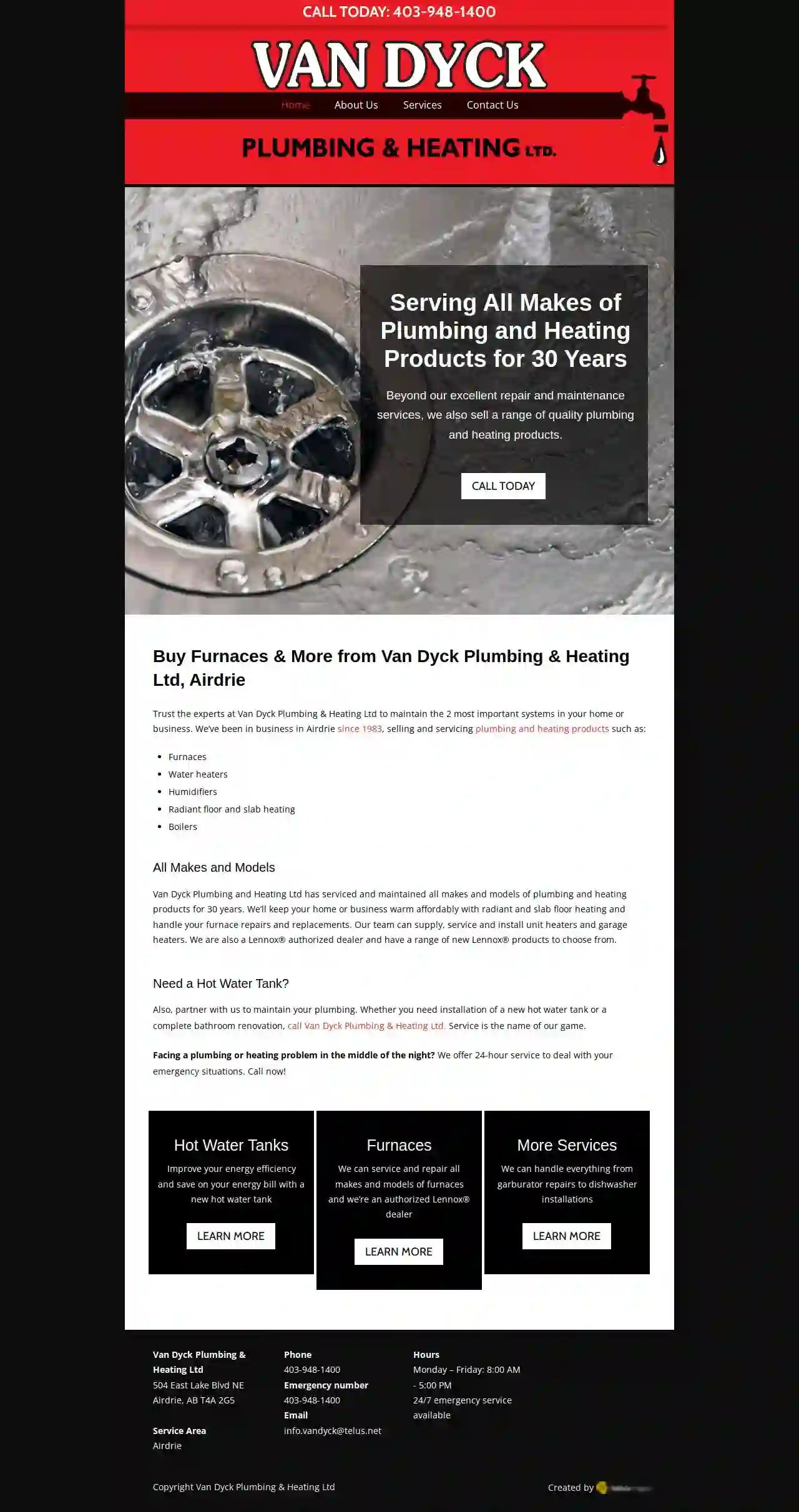
Van Dyck Plumbing & Heating Ltd
4.130 reviewsAirdrie, GB- Services
- Why Us?
- Gallery
Get Quote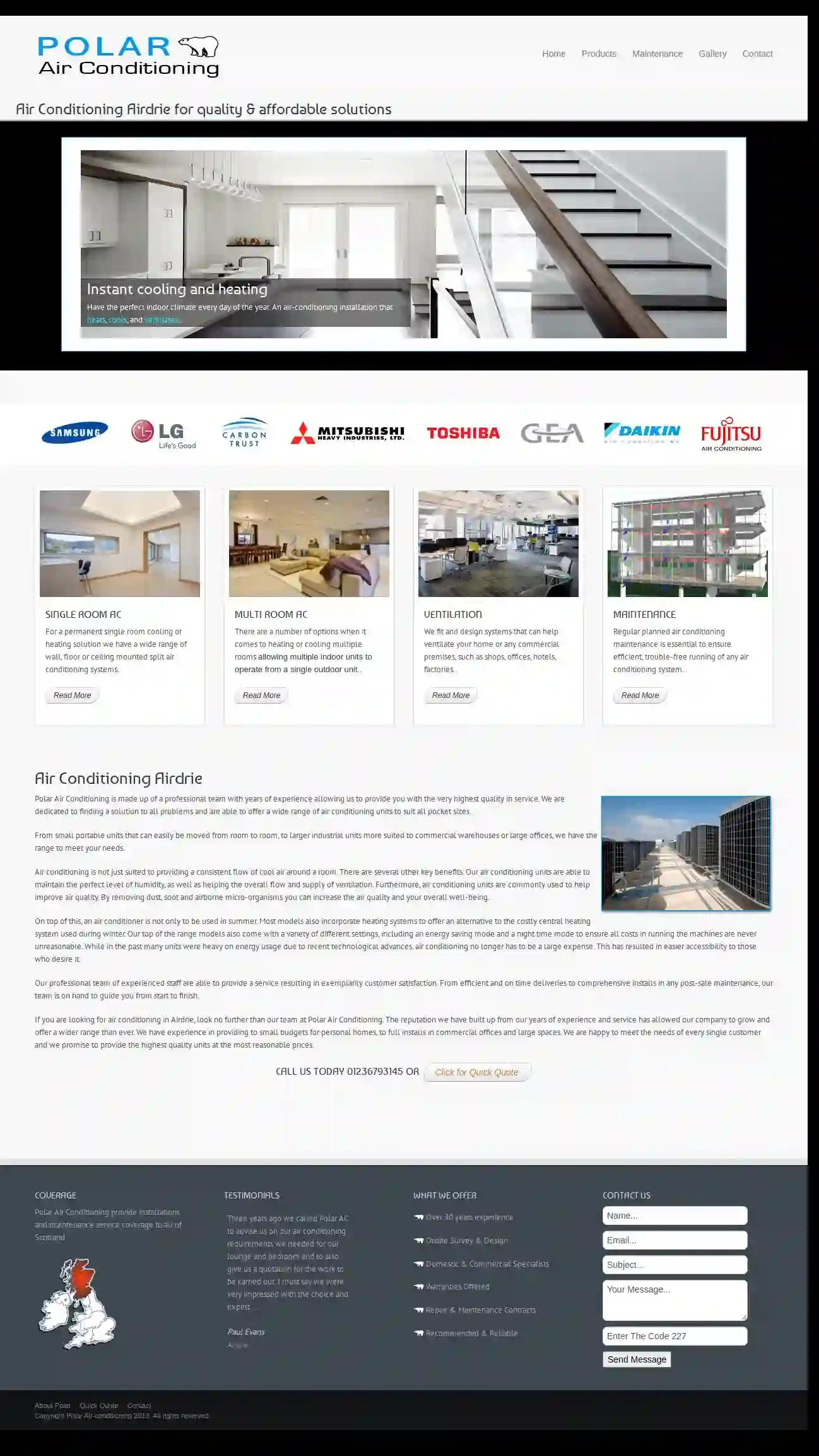
Polar Air Conditioning
51 reviewsAirdrie, GBPolar Air Conditioning is a team of professionals with years of experience, dedicated to providing the highest quality service in Airdrie. We offer a wide range of air conditioning units to suit all budgets, from small portable units for personal homes to larger industrial units for commercial warehouses or large offices. Air conditioning is not just about cool air. Our units maintain the perfect humidity level, improve ventilation, and enhance air quality by removing dust, soot, and airborne microorganisms. Many models also incorporate heating systems, offering an alternative to costly central heating during winter. Our top-of-the-range models feature energy-saving and nighttime modes to keep running costs reasonable. Thanks to recent technological advancements, air conditioning is no longer a major expense, making it more accessible than ever. Our experienced team provides exemplary customer satisfaction, from efficient deliveries and comprehensive installations to post-sale maintenance. We guide you through every step of the process. If you're looking for air conditioning in Airdrie, look no further than Polar Air Conditioning. Our reputation for quality and service has allowed us to grow and offer a wider range than ever before. We cater to all needs, from small personal homes to large commercial spaces, always providing the highest quality units at the most reasonable prices.
- Services
- Why Us?
- Gallery
Get Quote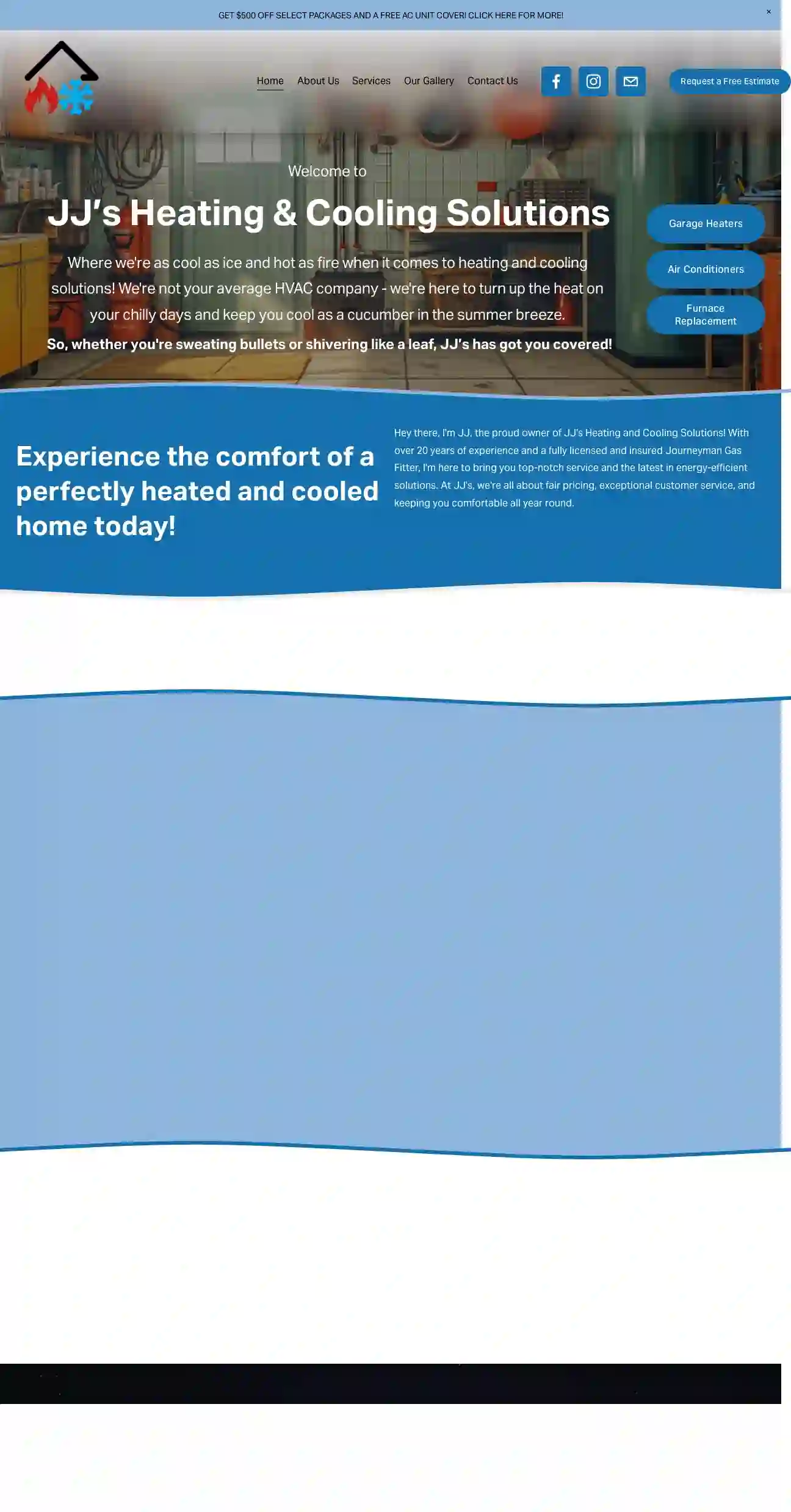
JJ’s Heating and Cooling Solutions
59 reviewsAirdrie, GBJJ's Heating & Cooling Solutions is a company that provides heating and cooling solutions to homeowners. With over 20 years of experience, they offer a range of services including garage heaters, air conditioners, furnace replacement, and HEPA air cleaners. They pride themselves on fair pricing, exceptional customer service, and keeping customers comfortable all year round. They serve Calgary, Airdrie, and the counties of Rockyview & Mountain View in Alberta.
- Services
- Why Us?
- Our Team
- Testimonials
- Gallery
Get Quote
Timberline Plumbing Ltd
521 reviewsCalgary, T2N, GBTimberline Plumbing is a family-owned business with over 15 years of experience serving Calgary and the surrounding area. We've built a strong reputation for being responsive, reliable, professional, and ethical. We offer a wide range of plumbing and heating services, from fixing leaky faucets to installing new bathrooms. Our team of experienced plumbers is dedicated to providing high-quality workmanship and exceptional customer service. We're available 24/7 for emergency service, and we offer free on-site estimates. At Timberline Plumbing, we stand behind our work with a 2-year parts and labor warranty.
- Services
- Why Us?
- Our Team
- Testimonials
- Gallery
Get Quote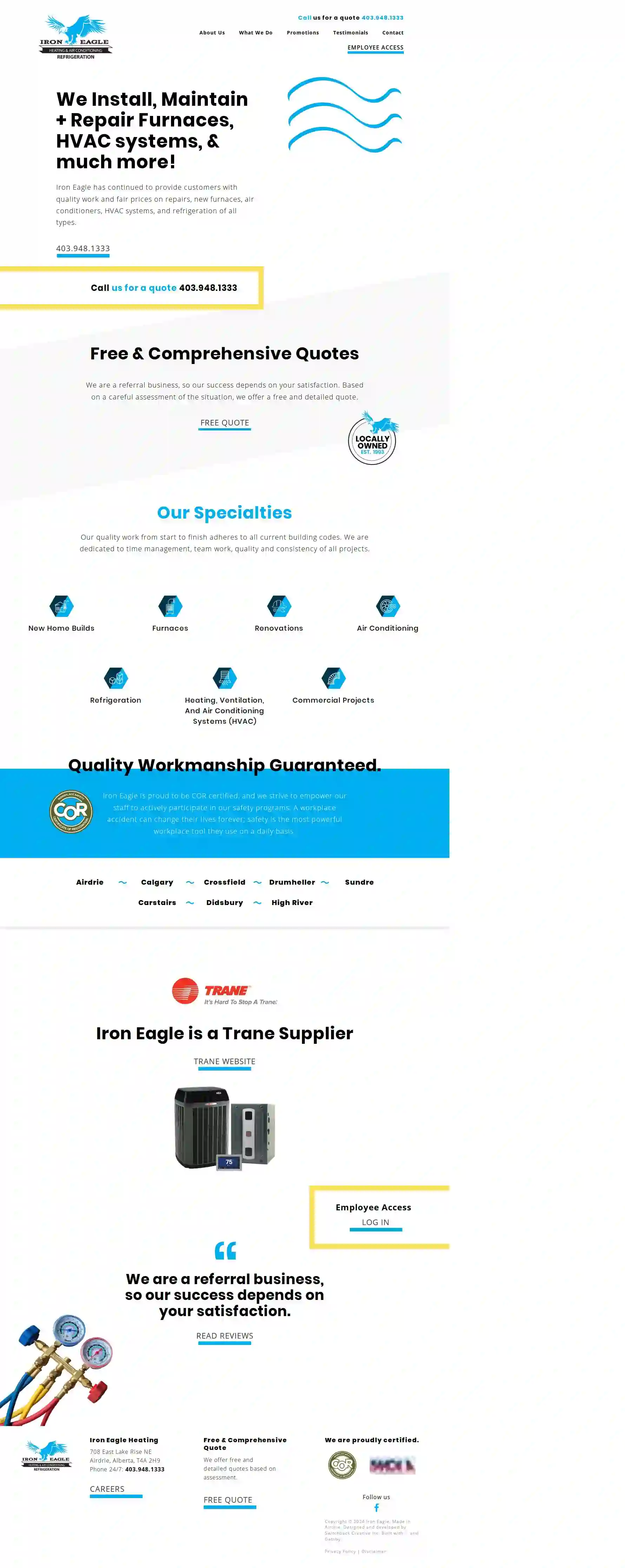
Iron Eagle Sheet Metal Ltd
4.620 reviews708 East Lake Rise NE, Airdrie, T4A 2H9, GBIron Eagle Heating & Air Conditioning is a trusted provider of heating and air conditioning services in Airdrie, Alberta. With years of experience and a commitment to customer satisfaction, we offer free and comprehensive quotes based on assessment. Our team is proudly certified and dedicated to providing top-notch service to our clients. Contact us today to schedule an appointment and experience the difference for yourself.
- Services
- Why Us?
- Accreditations
- Gallery
Get Quote
Airdrie Air Ltd. Heating & Air Conditioning
5469 reviews151 East Lake Blvd NE, Airdrie, T4A 2G1, GBPROUDLY SERVING AIRDRIE & CROSSFIELD YOUR #1 CHOICE FOR HEATING & COOLING Proudly Serving Airdrie & Crossfield Schedule Service Top-Rated Heating & Air Conditioning in Airdrie Heating Our Heating products are designed to provide efficient and reliable heating and cooling solutions for your home or business. See Service$ Cooling From ductless mini-splits to central AC units, our air conditioning products provide reliable cooling and improved indoor comfort See Service$ Promotions Elevate comfort with HVAC promotions! Our heating solutions ensure efficient, reliable climate control for your home or business. See Promos$ About Us Providing Comfort every hour, in every season Welcome to Airdrie Air, your trusted partner for top-notch HVAC maintenance and repair services in Airdrie, AB! At Airdrie Air, we specialize in keeping your home comfortable year-round with our expert care for furnaces and AC units. Founded on a commitment to excellence, our team, led by industry professionals, is dedicated to delivering premium service that ensures your heating and cooling systems run efficiently. Why Choose Us? R Seasoned Professionals: Each task is handled by our experienced technicians who bring a wealth of knowledge and years of expertise to the table. R All-Encompassing Solutions: Whether it's regular upkeep or urgent repairs, we have your HVAC requirements fully addressed. R Timely and Reliable: Rely on our services for timely assistance that accommodates your schedule, guaranteeing your comfort is always prioritized. R Customer-Focused Approach: Your contentment is our foremost concern, and we strive to surpass your expectations by going above and beyond. FINANCING OPTIONS Flexible Landing Options Of Your New System We know purchasing a furnace, central air conditioner, or HVAC system can be a large investment; this is why Airdrie Air has partnered with Finance It to provide financing options so you can stay comfortable in your home today. Get Pre-Approved
- Services
- Why Us?
- Our Team
- Testimonials
- Gallery
Get Quote
Cooper Mechanical
515 reviewsAirdrie, GBWelcome to Cooper Mechanical, your trusted source for heating, cooling, and all HVAC services in the Airdrie and Calgary area, with over 16 years of combined experience, we provide exceptional expertise and reliable solutions to meet all your HVAC needs in Calgary and the surrounding areas. We are locally owned and operated out of Airdrie. We invite you to explore our website and discover the full range of services we offer. Whether you need a new HVAC system installation, routine maintenance, or emergency repair, we are here to provide you with the highest quality service and expertise. Contact us today to schedule a consultation or learn more about how we can meet your heating, cooling, and HVAC needs.
- Services
- Why Us?
- Our Team
- Testimonials
- Gallery
Get Quote
Cyclone Plumbing & Heating Ltd
3.150 reviews#102 – 2890 Kingsview Blvd SE, Airdrie, T4A 0E1, GBCyclone Plumbing and Heating is a trusted and experienced plumbing, heating, and cooling company serving Airdrie and Calgary. We are dedicated to providing expert residential services, including installation, repair, and maintenance for all your plumbing and HVAC needs. Our team of certified technicians is committed to upholding the highest standards of quality workmanship and customer service. We pride ourselves on our fast, reliable, and upfront pricing, ensuring your complete satisfaction. With a 2-year guarantee on all workmanship, you can trust Cyclone Plumbing and Heating to deliver exceptional results.
- Services
- Why Us?
- Gallery
Get Quote
Hotpoint Repairs Wishaw
Wishaw, GBExpert appliance repairs by Hotpoint. It couldn’t be easier to get your appliance repaired back to full working order. With nationwide coverage, fully qualified engineers and a full 12 month repair guarantee, simply book your repair online or call to speak to one of our advisors. We repair all large domestic appliances such as washing machines, refrigerators, dishwashers, cookers & tumble dryers, and service major brands including Hotpoint, Whirlpool, Indesit, Cannon and Creda. Choose from a fixed price repair or opt for one of monthly payment options which also benefit from additional maintenance and support cover. Visit us today.
- Services
- Why Us?
- Gallery
Get Quote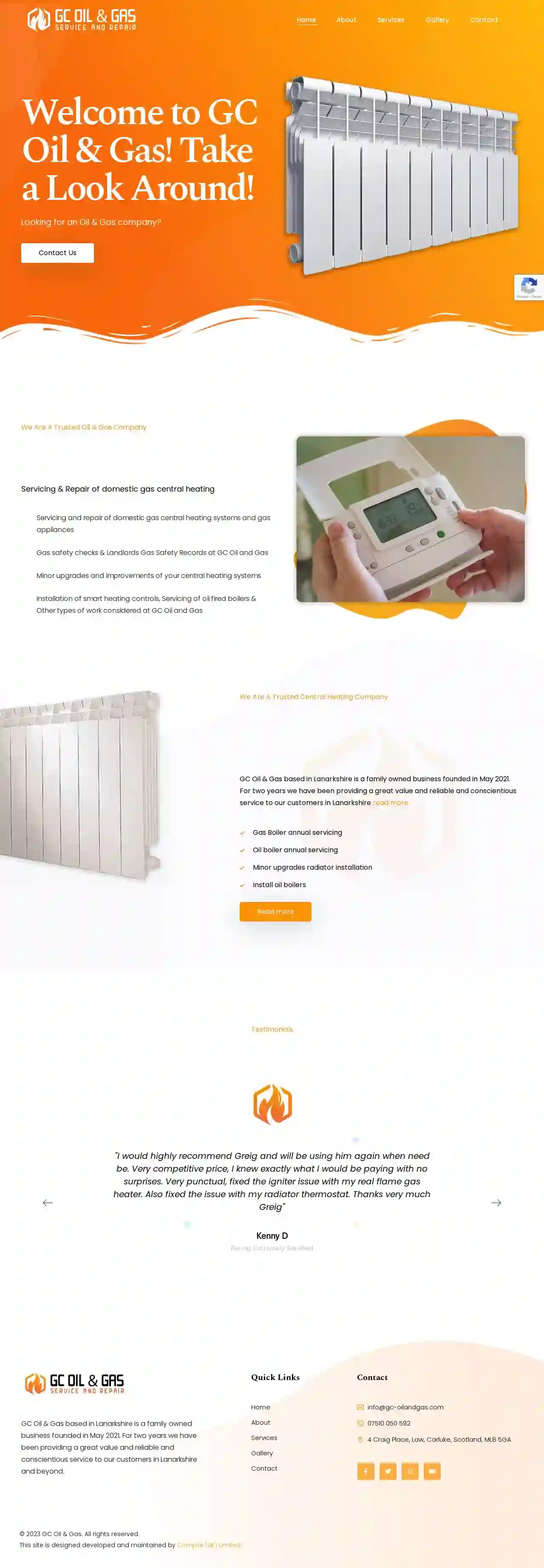
GC Oil & Gas Ltd
58 reviews4 Craig Place, Law, ML8 5GA, GBGC Oil & Gas is a family owned business based in Lanarkshire, Scotland, established in May 2021. We are a Gas Safe registered and OFTEC qualified company with over 20 years of experience in the industry. We provide cost-effective, reliable, and conscientious service to our customers in Lanarkshire and beyond. Whether you need a new oil fired installation, a system upgrade, smart controls, repairs, or servicing for your gas or oil boiler or other gas appliances, we're your trusted partner. We pride ourselves on delivering high-quality work at competitive rates.
- Services
- Why Us?
- Accreditations
- Our Team
- Testimonials
- Gallery
Get Quote
Over 12,692+ HVAC Contractors on our directory
Our HVAC experts operate in Bellshill and surrounding areas!
HVACCompaniesHub has curated and vetted Top HVAC Businesses in Bellshill. Find a trustworthy contractor today.
Frequently Asked Questions About HVAC Companies
- Reduced Airflow: Noticeably weaker airflow from your vents.
- Dusty Vents: Dust accumulation around your vents.
- Increased Dust: More dust than usual in your home.
- Allergies or Respiratory Issues: Worsening allergy symptoms or respiratory problems.
- Higher Energy Bills: Your furnace becomes less efficient.
- Overheating: The system overheats due to restricted airflow.
- Frequent Repairs: If your system requires repairs frequently, it may be more cost-effective to replace it.
- Age of System: HVAC systems typically last 15-20 years. If your system is nearing or beyond that age, it's likely less efficient and more prone to breakdowns.
- Increased Energy Bills: A significant rise in energy bills could indicate your system is losing efficiency and needs replacement.
- Uneven Temperatures: If some rooms are too hot or too cold, it could be a sign of an inefficient HVAC system.
- Poor Indoor Air Quality: If you're experiencing allergies, dust, or other indoor air quality issues, a new HVAC system with better filtration could help.
- Strange Noises or Smells: Unusual noises or foul odors emanating from your HVAC system could signal the need for a new HVAC system.
- Age: Furnaces typically last 15-20 years. If yours is significantly older, replacement is often the better overall choice.
- Frequency and Cost of Repairs: If you've been having repeated repairs, replacing the furnace might be more cost-effective in the long run.
- Energy Efficiency: Newer furnaces are significantly more energy-efficient, which can lead to lower energy bills.
- Safety Concerns: Older furnaces might have safety issues, such as carbon monoxide leaks. A new furnace offers enhanced safety features.
- Experience: Choose a contractor with extensive experience in the HVAC industry, especially in the type of service you need.
- Licensing and Insurance: Verify that the contractor is properly licensed and insured.
- Certifications: Look for NATE (North American Technician Excellence) certification, which indicates a high level of technical competency.
- Reputation: Check online reviews and ratings to assess the contractor's reputation and customer satisfaction levels.
- References: Ask for references from past customers and contact them to inquire about their experience.
- Estimates and Quotes: Get written estimates or quotes from multiple contractors to compare pricing and services.
- Warranty Information: Ask about warranties on equipment and labor.
- Communication: Effective communication is key. Choose a contractor who responds promptly and clearly answers your questions.
How can I tell if my furnace filter needs changing?
What are the signs that I need a new HVAC system?
Should I repair or replace my old furnace?
How do I choose the right HVAC contractor?
How can I tell if my furnace filter needs changing?
- Reduced Airflow: Noticeably weaker airflow from your vents.
- Dusty Vents: Dust accumulation around your vents.
- Increased Dust: More dust than usual in your home.
- Allergies or Respiratory Issues: Worsening allergy symptoms or respiratory problems.
- Higher Energy Bills: A dirty filter restricts airflow, forcing your furnace to work harder.
- Overheating: The system overheats due to restricted airflow.
What are the signs that I need a new HVAC system?
- Frequent Repairs: If your system requires repairs often, it may be more cost-effective to replace it.
- Age of System: HVAC systems typically last 15-20 years. If your system is nearing or beyond that age, it's likely less efficient and more prone to breakdowns.
- Increased Energy Bills: A significant rise in energy bills could indicate your system is losing efficiency and needs replacement.
- Uneven Temperatures: If some rooms are too hot or too cold, it could be a sign of ductwork problems or an undersized/aging system.
- Poor Indoor Air Quality: If you're experiencing allergies, dust, or other indoor air quality issues, a new HVAC system with better filtration could help.
- Strange Noises or Smells: Unusual noises or foul odors emanating from your HVAC system could signal the need for a new HVAC system.
Should I repair or replace my old furnace?
- Age: Furnaces typically last 15-20 years. If yours is significantly older, replacement is often the better overall choice.
- Frequency and Cost of Repairs: If you've been having repeated repairs, replacing the furnace might be more cost-effective in the long run.
- Energy Efficiency: Newer furnaces are significantly more energy-efficient, which can lead to lower energy bills.
- Safety Concerns: Older furnaces can pose safety risks, such as carbon monoxide leaks. A new furnace offers enhanced safety features.
How do I choose the right HVAC contractor?
- Experience: Choose a contractor with extensive experience in the HVAC industry, especially in the type of service you need.
- Licensing and Insurance: Verify that the contractor is properly licensed and insured.
- Certifications: Look for NATE (North American Technician Excellence) certification, which indicates a high level of technical competency.
- Reputation: Check online reviews and ratings to assess the contractor's reputation and customer satisfaction levels.
- References: Ask for references from past customers and contact them to inquire about their experience.
- Estimates and Quotes: Get written estimates or quotes from multiple contractors to compare pricing and services.
- Warranty Information: Ask about warranties on equipment and labor.
- Communication: Effective communication is key. Choose a contractor who responds promptly and clearly answers your questions.